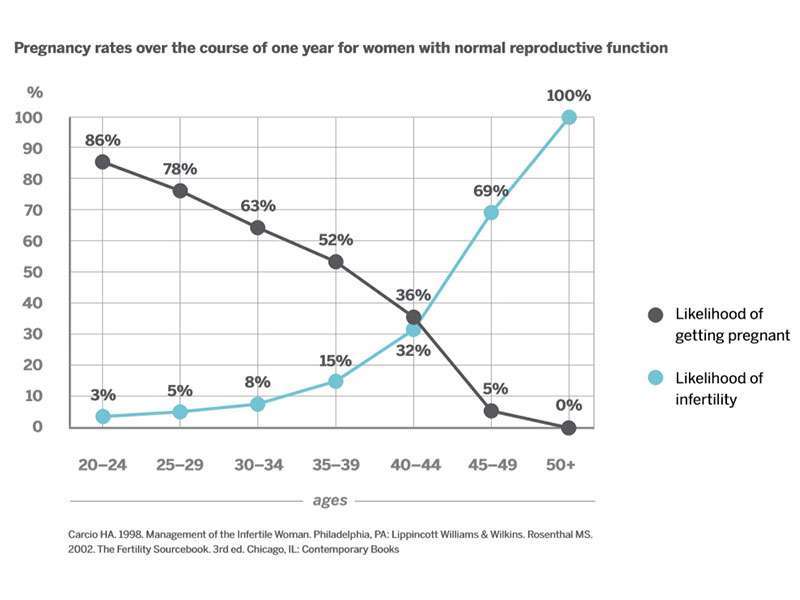WHY FREEZE YOUR EGGS
Egg freezing, or oocyte cryopreservation, empowers you to suspend the ever-ticking biological clock and bank your eggs for future use. Many in the medical field believe we are on the onset of a prodigious social change, and that egg freezing will impact reproductive freedom as the birth control pill did in the 1960s.


FERTILITY FACTS EVERYONE SHOULD KNOW
- The key to fertility is the age of the eggs, not chronological age
- At birth, a female is born with all the eggs she will make in her lifetime
- By the time a female is 30, she has lost 88% of her eggs and by the time she is 40 she has lost 97% of her eggs
- Roughly 1/3 of people ages 35-39 have fertility problems, that skyrockets to 64% in people ages 40-44
- It is expected that over 10,000 females will choose to freeze their eggs this year
“Freezing my eggs took a giant weight off my shoulders. I had just gotten out of a long-term relationship and I decided to make myself and my dreams a priority. Now, I don’t feel the need to lower my dating standards in order to beat my biological clock”
– Katie, 34
THE EGG FREEZING PROCESS
-
Reproductive Health Physical
You will meet with your MLF physician for blood tests, ultrasound and personalized discussion of your fertility health and goals. 95% of insurance will cover this appointment.
-
Ovarian Stimulation
Over a period of 9-12 days we will stimulate your ovaries with self-administered injections. You will also have approximately 5 to 7 early morning monitoring appointments.
-
Egg Retrieval
In our state-of-the-art surgery center your doctor will gently guide a needle attached to a catheter through your vaginal wall to collect your eggs. The painless procedure will take 10-20 minutes and you will be under twilight anesthesia. There are no stitches or scars and most patients return to work the following day.
-
Freezing and Storage
Your collected eggs are then frozen using an advanced method called vitrification. Immediately after they are vitrified, your eggs will be placed into one of our liquid nitrogen storage containers in our state-of-the-art laboratory. Mechanisms are in place to ensure the safe long-term storage of your eggs.
THE MAIN LINE FERTILITY DIFFERENCE

SUPPORT
Dedicated patient liason to provide you personalized care throughout the process

EXPERTISE
Experienced Reproductive Endocrinologists and care team

CONVENIENCE
6 locations, on-site surgery center, early morning appointments

RESULTS
Latest vitrification technology and state-of-the-art laboratory ensuring optimal outcomes

AFFORDABILITY
Competitive pricing below industry average
INVESTMENT
Main Line Fertility offers patients nationally recognized fertility care combined with a comprehensive egg freezing program

A Main Line Fertility egg freezing package includes:
- Monitoring appointments
- Egg retrieval
- Cryopreservation
- First year of storage
Additional costs:
- Anesthesia
- Medication
- Annual storage
* The national average for one egg freezing cycle is $11,000, according to a 2017 report by FertilityIQ.com
Frequently Asked Questions
Eggs frozen from vitrification technology are suspended in time. As a result, eggs can be frozen indefinitely.
No. At the beginning of each menstrual cycle, literally hundreds of eggs begin the “race” to ovulation. Each month, only one egg is ovulated and the rest degenerate – they are lost forever. The medications we use allow many more of those eggs, which are otherwise lost, to reach maturity and retrieval for freezing.
No. Egg freezing gives women the chance to take control of their fertility and gives them the best chance to have biological children in the future, but it cannot guarantee a baby. Based on a 2017 study published in Human Reproduction, women under the age of 35 who freeze 10-20 eggs have between a 70%-90% chance of at least one live birth in the future.
Patients between the ages of 30 to 40, specifically early to mid-30’s, are the ideal age to freeze their eggs. Factors that warrant egg freezing sooner than just age would include a family history of premature ovarian failure or early menopause, a recent cancer diagnosis, and a diagnosis of endometriosis or polycystic ovarian syndrome (PCOS).
Yes. While advanced age is one of the top causes of infertility, lifestyle factors also play a role in fertility health. Healthy choices that can affect fertility includes regular exercise, maintaining a healthy weight, and taking a multivitamin that contains folic acid. Additionally, we suggest keeping stress under control, preventing sexually transmitted diseases, avoiding smoking and refraining from substance abuse.
Questions about egg freezing? We are here to help!
E-mail our egg freezing coordinator at [email protected]